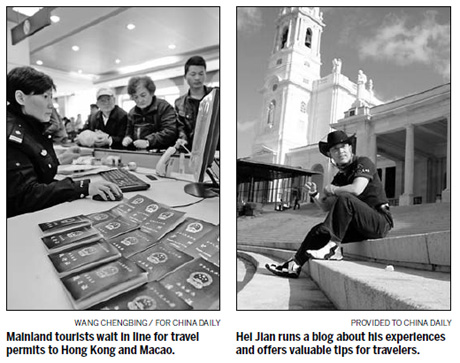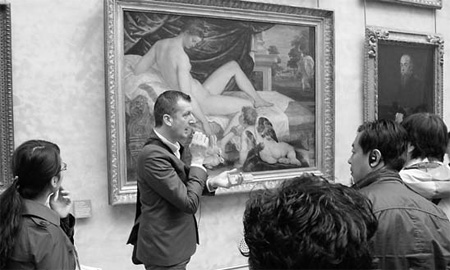Life and Leisure
Going global
By Chen Yingying (China Daily)
Updated: 2010-09-22 08:12
 |
Large Medium Small |
|
Zhang Guangzhu and his wife Wang Zhongjin emptied all their savings on an 88-day tour of 16 countries in 2008. Provided to China Daily |
Not just young white-collar workers but even retired Chinese are backpacking around the world. Chen Yingying with China Features reports
Unlike most Chinese retirees who stay at home helping their children, Zhang Guangzhu and Wang Zhongjin, grandparents of a 7-year-old boy in Beijing, backpack around the world. They started in 2007 when the couple came across a 60-year-old Australian backpacker traveling alone in Mount Minling in southwestern Yunnan province.
"If foreigners can travel to China alone, why can't we go to their countries on our own?" Zhang says.
Zhang retired from China Hua'neng Group, a State-owned power generation enterprise, in 2008.
"Staying at home every day is not the life we want," says the 64-year-old.
In March 2008, Zhang and his wife, who is three years younger than him, headed for the airport, carrying 30-kg backpacks. Qatar Airways took them to Athens where they began an 88-day, 16-country trip to such places as Greece, Italy, Norway and Germany.
Before this trip, the couple spent about six months learning survival English, and briefed themselves on the countries' histories and cultures.
"I feel young when I carry my backpack," Zhang says.
Their bags contained Lonely Planet guidebooks, an emergency English phrasebook, an electronic English dictionary, a laptop, a GPS device, a digital video camera, an electromagnetic pan and a rice cooker.
Their shoes wore out and they spent all their savings of about 100,000 yuan ($14,850). Yet their desire to experience new places did not abate.
"During the trip, we were impressed by the different cultures and couldn't wait to take another trip to see more outside of China," Wang says. They plan to visit 25 more countries in Asia, Europe and the Americas.
"We even considered selling our apartment if our bank deposits run out," Zhang says. Their two-bedroom apartment in Beijing' Fengtai district is currently priced at more than 1 million yuan.
Zhang recalls that when they were young, they toiled hard to make both ends meet. "Now is the best time in our lives to travel around the world," he says.
These grandparents are not alone. Chinese tourists spent $42 billion last year around the world, according to the Annual Report of China's Outbound Tourism of 2009 by the National Tourism Administration (NTA).
The latest figures from www.Qunar.com, China's largest travel information search engine, revealed that although group tours still form the major bulk of outbound tourism, some 30 percent of Chinese tourists chose to travel on their own in the first half of 2010.
Latest figures from the NTA reveal the number of outbound tourists has continued climbing, reaching 47.7 million in 2009. It has multiplied by at least eightfold since 1997, when the State Council endorsed regulations that officially allow Chinese citizens to travel abroad.
Professor Li Xinjian, dean of tourism management at Beijing International Studies University, which was one of the first Chinese universities to offer courses in tourism management, says dramatic changes in Chinese society have brought attention to peoples' desire for leisure.
"Economic development allows more people to travel," he says.
"The proportion of individual tourists will increase, as tourists begin to seek more relaxation rather than cursory sightseeing in their travel."
About 10 years ago, most outbound Chinese tourists had to arrange group business tours through travel agencies, Li says.
Today, 139 countries and regions are open to Chinese tourists, says Feng Jin with China Youth Travel Service, a leading travel agency in the country. Many countries offer individual tourist visas to eligible Chinese applicants.
Hei Jian, 40, was bitten by the global travel bug in junior high school, when the romantic travel stories of Taiwan novelist Echo Chan (Sanmao) were popular in the country.
In 2001, when he first applied for a business travel visa to the European Union, the documents he had to prepare ranged from a recommendation letter from his employer to the household registration of his family.
"Traveling abroad today is much easier than 10 years ago," he says.
He has visited 65 countries and spent an average of less than 5,000 yuan per country.
"I save a lot on transportation and accommodation," he says.
"Zero-dollar" airline tickets (a special-offer ticket to promote sales), and staying in youth hostels and the homes of the friends he meets on the way help him save money.
"Also, I don't shop for luxuries. I prefer small, local handicraft souvenirs," he says.
Hei Jian gives practical travel tips and shares his travel experiences on his blog, Walking Through 40 Countries, at sina.com. The entries about his journey to North Korea have attracted more than 200,000 readers since 2008.
"I hope the experiences and tips can encourage more young Chinese to see the world," he says.
Economic Travel Net (Go2eu.com), one of the country's top travel information websites, offers tips, itineraries and travelers' testimonials. The majority of the website's users are overseas Chinese students and white-collared workers in China or abroad.
One of them, Li Ziran, 26, became fascinated with the Santorini islands in Greece in elementary school, when she saw photos of the place.
During her second year in Beijing Polytechnic University, she went to the Capital Airport and stared at the rolling information board, dreaming of the day she would be on a plane flying abroad.
"I imagined that the planes were taking me to see the world, flying from one city to another, to places where I am a total stranger," she says.
She finally got a chance to go abroad after she graduated and landed a job in 2006. A few months ago, she traveled to Malaysia with her parents, who run a company in Beijing. "I will never stop chasing my dream," she says.
As for the grandparents Zhang Guangzhu and Wang Zhongjin, they are preparing for a trip to South America, where the ancient Mayan civilization has captivated their attention.
They are also preparing their will. "We don't want to leave a mess for the family if anything unexpected should happen on the road," Wang says.
|
A French tour guide explains in Chinese the importance of paintings in the Louvre to Chinese tourists. The museum in Paris also has many brochures in Chinese. Bao Xinguo / for China Daily |


